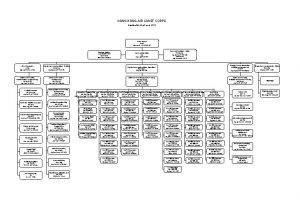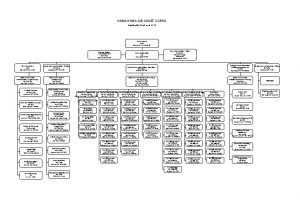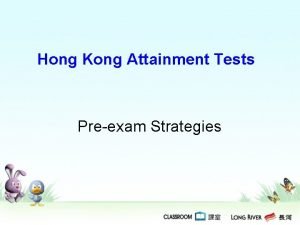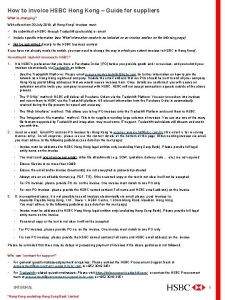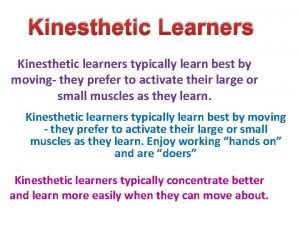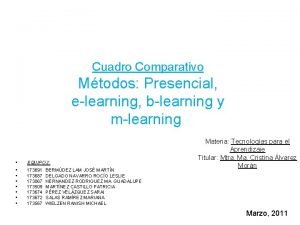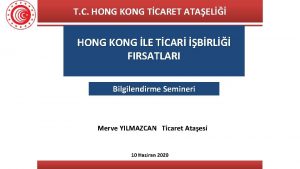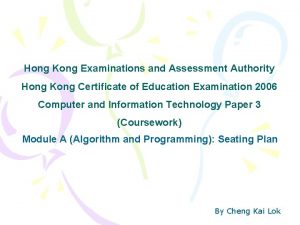Learning to Learn English in the Hong Kong













































































- Slides: 77

Learning to Learn English in the Hong Kong Context by Lam Ka-wai, Pamela

Are you a learner or a teacher of English?

What is learner training?

‘Learner training aims to help learners consider the factors that affect their learning and discover the learning strategies that suit them best and which are appropriate to their learning context. So that they may become more effective learners and take on more responsibility for their own learning. ’ (Barbara Sinclair 2000) From Independence Issue 38, 66

Give a man a fish…

Give a man a fish and he eats for a day;

Give a man a fish and he eats for a day; Teach him how to fish…


Give a man a fish and he eats for a day; Teach him how to fish and he eats for a lifetime. 授人以鱼不如授人以渔 -An Ancient Confucius Proverb

Why Learner Training?

Learner training helps learners to be more efficient and skilful in language learning.

…Given the inevitable limitation in time and resources for teaching specific language content, it is now clear that learners could benefit greatly in the long run if a substantial proportion of the formal time available were given over to training students in ways of learning for themselves. Willing, K. (1987)

Learner training helps children to avoid or overcome affective obstacles in language learning.

Good learners are those who know how to control their emotion and attitude about learning. (Sarignon, 1983)

The affective side, like, personal belief, motivation, self-esteem, anxiety, inhibition, tolerance for ambiguity, etc. , of a learner is one of the factors affecting the success or failure in his/her language learning. Oxford, R. (1990)

Why learner training in Hong Kong?

Learning English through Acquisition is inefficient in Hong Kong. A wide range of language learning materials are easily accessible in Hong Kong.

Why having learner training activities in junior English curricular?

To clear misconceptions about English learning in Hong Kong To raise students’ language awareness To help students develop the correct attitude of English learning To raise students’ awareness of the need of learner autonomy To help students to overcome affective obstacles at this age, especially in speaking English To help student build the habit of self-directed English learning

An Outline of Learner Training Evaluation and Modification Recognition Reflection Self-directed Practice

Recognition • Cognitive Knowledge: Knowledge about English Examples: Grammar, Vocabulary, Phonetics • Metacognitive Knowledge: Knowledge about learning English Examples: Characteristics of a good language learner Knowing your learning style The nature of language learning Misconceptions about language learning Different learning strategies Learning English in Hong Kong, etc.

Attribute Success to… Hard Work Skilful Use of Strategies

Students should explicitly know the purposes of learner training activities

Possible Modes of Training in Hong Kong Structured Mode Integrated Mode

Promotion Course Outline Learning Strategy Training Teacher-student Conference

Mode: Integrated Level: S 1 Time: 6 lessons (during Orientation Cycle)

Stage 1: Promotion of Learner Autonomy

Activity One: Why English? Which language is spoken by the greatest number of people in the world? Which language is used by the greatest number of countries in the world? How many people in the world speak English as first language? How many people in the world speak English as second language?

Activity 2: Do you feel the same about learning English? People who can speak English are smart. Girls are better. Westerners are better. I can’t speak English well so I’m stupid. I can’t speak English well because I’m not talented in it.

Activity 3: What is a good language learner?

A Good Language Learner Highly motivated Seeking opportunities to use English Confident: compensation strategies, thinking time technique Hard-working Not easily offended Exposes himself/herself to English Able to overcome anxiety, frustrations, inhibitions Good learning strategies: analyze, organize, categorize Prepared to take risks

Why do I learn English? Tick the suitable box(es). _____ For entering University _____ For good grades _____ For better job opportunity _____ For travel _____ For passing the HKDSE _____ For making friends with westerners _____ Because it’s fun _____ Others: ________

Activity 5: How good is your English?

Self-assessment Form 5= Standard that I want to reach 1 = I can do very little. I am a long way from my goal. Vocabulary Grammar Listening Speaking Reading Writing 1 1 1 2 2 2 3 3 3 4 4 4 5 5 5

Activity 6: What should I spend more time on?


Activity 7: What should I do next?

My English Learning Plan 1 Listening Speaking Reading Writing Vocabulary Grammar 2 3 4

Activity 8: Teacher-student Contract

Teacher-student Contract This is an agreement between _______ and _______ on ______2010 I promise that I will try my very best and do as much as I can to help____ learn English independently. ______ ( ) I promise that I will attend conferences punctually, and try my very best to carry out the self-directed English learning plans. ______ ( )

Mode: Integrated Level: S 2 Time: 6 lessons (during Orientation Cycle)

Activity 10: What sort of language learner are you?

Metacognitive knowledge What sort of language learner are you? Usually Sometimes Almost never Don’t know 1. Did you get good results in grammar tests? 2. Do you have a good memory for new words? 3. Do you hate making mistakes? 3 points for each Usually; 2 points for each Sometimes, etc.

What kind of language learner are you? Description Suggestions Score: 9 -13 points Relaxed? You seem to pick up languages without really making too much effort…, however you should be learning more grammar rules, … -Try being more selfcritical: you probably need to correct yourself more. -Try finding more time to learn grammar, pronunciation, etc. -Try to organise a regular time for learning.

Activity 11: Need Analysis

Need Analysis Tick the box Why I learn English For entering university For passing the HKDSE For making friends with westerners My English standard to achieve the goal Have you achieved your goal? (Yes/No)

The English Standard I need to reach Listening Speaking Reading Writing Grammar Vocabulary My English standard at present Do I need to do something about it?

Do I have them? Computer TV Magazines Newspapers Library cards ipod How can I use them?

Plan Sunday Monday Tuesday Morning Lunchtime Afternoon Evening





Towards Autonomy English Learning VISA Name of Student: Name of Teacher: Learning Style: Mixed/ Analytical / Relaxed / Not Sure Focus Area (2010 -2011): Listening / Speaking / Reading / Writing/ Grammar / Vocabulary Goal: Level of English needing to achieve: Aids Plan A Plan B Day of Week Time How to Learn How to Review

Self-directed Learning Record Name: Date Plan Class: S 2___ Focus Materials Grade How did I feel? Month: What could I have done better?





Memory Strategies Compensation strategies Cognitive strategies Learning Strategy Training Metacognitive strategies Affective strategies Social strategies

Memory Strategies Compensation strategies Cognitive strategies Learning Strategy Training Metacognitive strategies Affective strategies Social strategies

Activity 9: Memory strategy--reviewing well The Amount of memory recalled without reviewing

A comparison between the amount of memory recalled without reviewing and reviewing regularly

Reviewing well: Structured reviewing Sun Mon Tue 1 st review after 10 min 2 nd review 4 th review Wed January Thur Fri 3 rd review Sat

Reviewing well: Structured reviewing Sun Mon Tue Wed February Thur Fri Sat 5 th review… Materials retained in the long-term memory.


Memory Strategies Compensation strategies Cognitive strategies Learning Strategy Training Metacognitive strategies Affective strategies Social strategies

Affective strategies—Taking Your Emotional Temperature Stress Checklist How do you feel about learning English? Tick the appropriate box. Tick the appropriate box. happy proud confident peaceful unhappy ashamed unconfident anxious

Affective strategies—Lowering your anxiety If I feel very stressed about learning English, what should I do? Breathe deeply. Listen to some soothing music. Think of a place that you have been where you felt relaxed and comfortable. Read a joke book. Do some tensing and relaxing exercise

Affective strategies—Encourage Yourself If I am discouraged, frustrated and I want to give up, what should I do? It’s OK if I make mistakes I AM improving! This is a necessary process. Every English learner has gone through this. Tell yourself: Cheer up! Never give up! I’m taking risks and doing well No pain; no gain. Try harder. Everybody makes mistakes; I can learn from mine.







Thank you for your attention!
 Hong kong budding poets (english) award online platform
Hong kong budding poets (english) award online platform Hkmc
Hkmc Hong kong institute of chartered secretaries
Hong kong institute of chartered secretaries Chinese university of hong kong library
Chinese university of hong kong library Strength of san miguel
Strength of san miguel Population pyramid taiwan
Population pyramid taiwan Https //extranetapps.hong kong airport.com
Https //extranetapps.hong kong airport.com Hong kong diploma of secondary education
Hong kong diploma of secondary education Hong kong air cadet corps
Hong kong air cadet corps Hong kong air cadet corps
Hong kong air cadet corps Department of land surveying and geo-informatics
Department of land surveying and geo-informatics Currency board
Currency board Weather chart hong kong
Weather chart hong kong Bloomberg academy
Bloomberg academy Hong kong triathlon association
Hong kong triathlon association Urban decay problem in hong kong
Urban decay problem in hong kong Hong kong baptist university school of communication
Hong kong baptist university school of communication Tectura hong kong
Tectura hong kong Ecommerce development hong kong
Ecommerce development hong kong Russian companies listed in hong kong
Russian companies listed in hong kong Hong kong certificate of education examination
Hong kong certificate of education examination Management consulting hong kong
Management consulting hong kong Hong kong chemistry olympiad
Hong kong chemistry olympiad Hong kong attainment test
Hong kong attainment test Fleet management hong kong
Fleet management hong kong City university of hong kong
City university of hong kong North satellite concourse
North satellite concourse Boys and girls association
Boys and girls association Concordia international school hong kong
Concordia international school hong kong Hong kong institute of technology
Hong kong institute of technology Breakfast for a sedentary worker
Breakfast for a sedentary worker Vtc library
Vtc library Feiertage hong kong
Feiertage hong kong Charltons law
Charltons law Business opportunities in hong kong
Business opportunities in hong kong Upper ngau tau kok estate
Upper ngau tau kok estate Have you ever been to disneyland
Have you ever been to disneyland Hong kong horse
Hong kong horse Non jupas
Non jupas The education university of hong kong
The education university of hong kong Hong kong
Hong kong Hong kong crowdfunding
Hong kong crowdfunding Hong kong olympiad in informatics
Hong kong olympiad in informatics Hong kong institute of educational research
Hong kong institute of educational research Hactl hong kong
Hactl hong kong Enders wong
Enders wong Ipd hong kong
Ipd hong kong Kidlat club rizal
Kidlat club rizal Hong kong peili
Hong kong peili University of hong kong
University of hong kong Reebok hong kong
Reebok hong kong Seng14 hong kong
Seng14 hong kong Markus jebsen
Markus jebsen Hong kong university
Hong kong university Water pollution in hong kong
Water pollution in hong kong Sense of touch sai kung
Sense of touch sai kung Facture paid invoice receipt via hsbc
Facture paid invoice receipt via hsbc Eurofins product testing hong kong limited
Eurofins product testing hong kong limited Stephen cheung hong kong
Stephen cheung hong kong Hong kong and shanghai banking corporation ap world history
Hong kong and shanghai banking corporation ap world history Hong kong private placement regulation
Hong kong private placement regulation Hong kong education city
Hong kong education city Patrick zheng
Patrick zheng Cdr websams
Cdr websams Golin hong kong
Golin hong kong Fenix group hong kong
Fenix group hong kong Etc hong kong
Etc hong kong Tvb singers male
Tvb singers male Types of drought
Types of drought Backdoor listing hong kong
Backdoor listing hong kong Evangelical lutheran church of hong kong
Evangelical lutheran church of hong kong The north face 100 hong kong
The north face 100 hong kong Hong kong holding company
Hong kong holding company Learn to learn
Learn to learn Cuadro comparativo de e-learning
Cuadro comparativo de e-learning How to motivate esl students
How to motivate esl students Learn to write in english
Learn to write in english Learn and share in english 2
Learn and share in english 2








